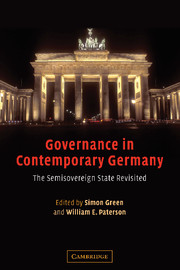Book contents
- Frontmatter
- Contents
- List of figures
- List of tables
- List of contributors
- Acknowledgments
- List of abbreviations
- 1 Introduction: Semisovereignty Challenged
- 2 Institutional Transfer: Can Semisovereignty be Transferred? The Political Economy of Eastern Germany
- 3 Political Parties
- 4 Federalism: the New Territorialism
- 5 Shock-Absorbers Under Stress: Parapublic Institutions and the Double Challenges of German Unification and European Integration
- 6 Economic Policy Management: Catastrophic Equilibrium, Tipping Points and Crisis Interventions
- 7 Industrial Relations: From State Weakness as Strength to State Weakness as Weakness. Welfare Corporatism and the Private Use of the Public Interest
- 8 Social Policy: Crisis and Transformation
- 9 Immigration and Integration Policy: Between Incrementalism and Non-decisions
- 10 Environmental Policy: the Law of Diminishing Returns?
- 11 Administrative Reform: Is Public Bureaucracy Still an Obstacle?
- 12 European Policy-making: Between Associated Sovereignty and Semisovereignty
- 13 Conclusion: Semisovereignty in United Germany
- References
- Index
9 - Immigration and Integration Policy: Between Incrementalism and Non-decisions
Published online by Cambridge University Press: 05 June 2012
- Frontmatter
- Contents
- List of figures
- List of tables
- List of contributors
- Acknowledgments
- List of abbreviations
- 1 Introduction: Semisovereignty Challenged
- 2 Institutional Transfer: Can Semisovereignty be Transferred? The Political Economy of Eastern Germany
- 3 Political Parties
- 4 Federalism: the New Territorialism
- 5 Shock-Absorbers Under Stress: Parapublic Institutions and the Double Challenges of German Unification and European Integration
- 6 Economic Policy Management: Catastrophic Equilibrium, Tipping Points and Crisis Interventions
- 7 Industrial Relations: From State Weakness as Strength to State Weakness as Weakness. Welfare Corporatism and the Private Use of the Public Interest
- 8 Social Policy: Crisis and Transformation
- 9 Immigration and Integration Policy: Between Incrementalism and Non-decisions
- 10 Environmental Policy: the Law of Diminishing Returns?
- 11 Administrative Reform: Is Public Bureaucracy Still an Obstacle?
- 12 European Policy-making: Between Associated Sovereignty and Semisovereignty
- 13 Conclusion: Semisovereignty in United Germany
- References
- Index
Summary
Introduction
In the context of immigration policy, Peter Katzenstein's (1987, pp. 209–53) original analysis of the recruitment and management of ‘migrant workers’ reflected the political priorities of the time. During the mid-1980s, West Germany was still struggling to come to terms with the immediate effects of the so-called ‘guestworkers’ immigration (Gastarbeiter), under which millions of young, mainly male workers from Mediterranean countries (principally Turkey, Yugoslavia, Italy, Spain, Greece and Portugal) had been recruited between 1955 and 1973 for work in West Germany. Although the recruitment ban (Anwerbestopp) of 23 November 1973 did prevent further new arrivals of labour migrants, most of the 4 million or so workers who remained in the country at that time began to make West Germany their home for good (Castles 1985).
This abrupt change in policy had a number of effects, which together helped to transform the issue of migrant labour into a much broader policy area by the time of unification in 1990. First, the perspectives of the remaining guestworkers in 1973 changed. Even though few members of this first generation of immigrants had initially envisaged spending the rest of their lives in West Germany, the practical likelihood of return to their countries of origin diminished with every year that passed (Bischoff and Teubner 1992, pp. 114–17). Second, the prospect of settling in Germany for either the medium or even the long term encouraged the development of new, secondary migration to West Germany in the form of dependants, otherwise known as family reunification (Familiennachzug).
- Type
- Chapter
- Information
- Governance in Contemporary GermanyThe Semisovereign State Revisited, pp. 190 - 211Publisher: Cambridge University PressPrint publication year: 2005



